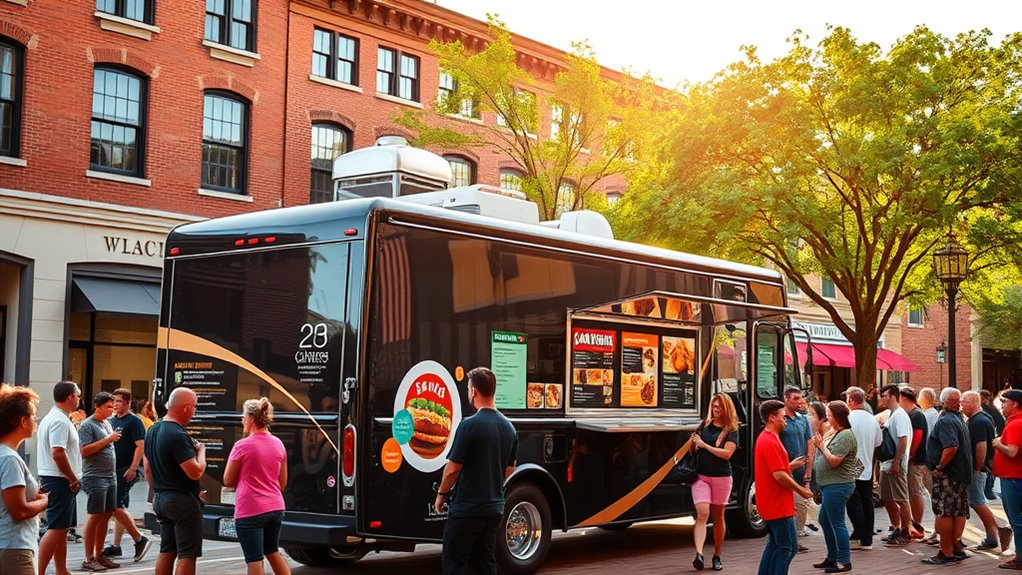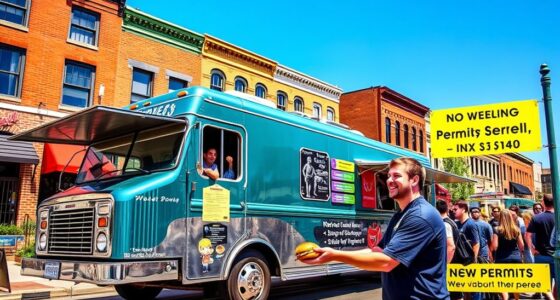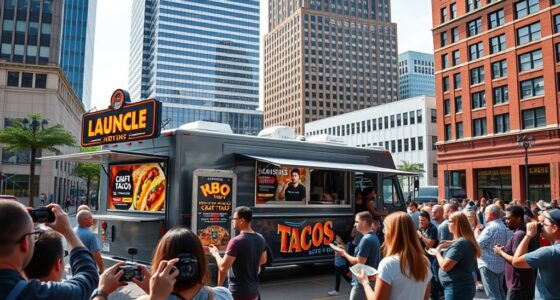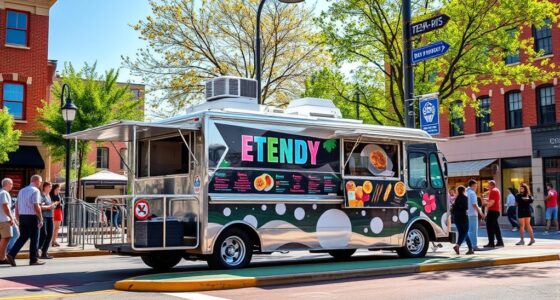To start your food truck in Columbia, Missouri, you’ll need to secure permits like a Mobile Food Establishment Permit and complete a Food Establishment application at least 30 days before opening. Budget around $15,000 to $85,000 for trucks, equipment, and initial inventory. Choose high-traffic locations like downtown streets and community events, and develop a simple menu with local favorites. Use social media and community engagement for marketing. For details on safety standards and compliance, keep exploring these key points.
Key Takeaways
- Obtain necessary permits, including a Food Establishment and Mobile Food Permit, and pass health inspections before operation.
- Budget approximately $15,000 to $85,000 for truck purchase, outfitting, initial inventory, and licensing costs.
- Focus on high foot traffic areas like downtown streets and special event zones, respecting parking and zoning regulations.
- Develop a simple menu featuring regional favorites, emphasizing local ingredients and food safety compliance.
- Use social media, community events, and data-driven marketing strategies to build brand awareness and attract customers.
Navigating Permit and Regulatory Requirements in Columbia
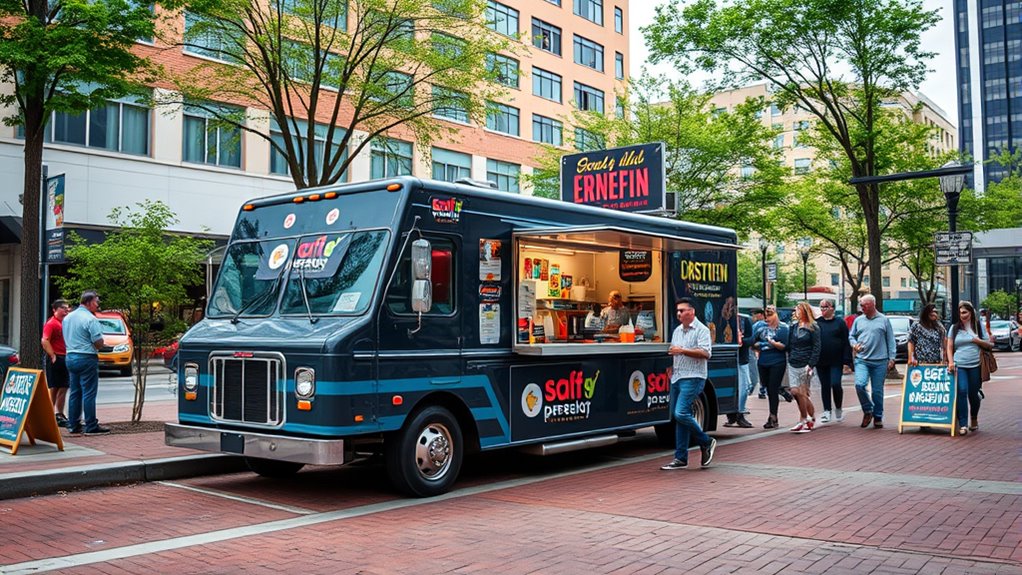
Traveling permit and regulatory requirements in Columbia are essential for food truck owners to operate legally and safely. You need to complete and submit a Food Establishment application at least 30 days before opening. Your operating permit is valid from July 1 to June 30 each year, with fees based on your gross food-related receipts and health priority levels, typically ranging from $150 to $450 annually. To get approved, you’ll need to pass a health inspection by the Columbia/Boone County Department of Public Health and Human Services, demonstrating compliance with local health codes and food safety standards. Make sure you provide a valid business license, food safety certification, and detailed menu information. Inspectors will verify your adherence during routine pre-opening and post-construction inspections, ensuring your food truck meets all health and safety regulations. Fees are structured to cover inspection and enforcement expenses, so be prepared to budget accordingly. Additionally, understanding the health inspection process can help streamline your approval and ensure compliance with all standards.
Understanding Costs and Budgeting for Your Food Truck Venture
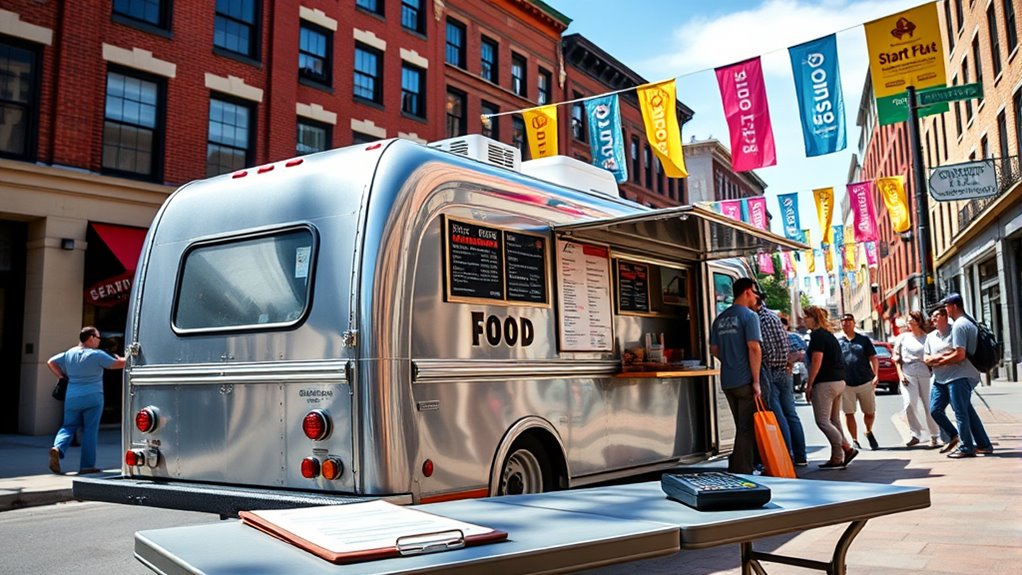
Starting a food truck business requires careful budgeting to guarantee you cover all essential costs without overspending. The initial vehicle costs vary widely: new trucks in Missouri typically range from $30,000 to $85,000, while used trucks can be found for $15,000 to $60,000. Outfitting the truck with kitchen appliances, signage, and storage usually costs $50,000 to $60,000, depending on customization. Your initial inventory may require $2,000 to $3,000, with startup expenses like labor, insurance, marketing, and utilities adding another $5,000 to $20,000 in the first year. Don’t forget ongoing costs—fuel, maintenance, waste management, and supplies—estimated between $500 and $1,200 annually. Food truck insurance costs should also be factored into your budget, typically ranging from $1,000 to $4,000 per year depending on coverage. Additionally, understanding cost management strategies can help you stay within your budget and ensure your food truck’s success from the start. Budget wisely to guarantee your food truck’s success from the start.
Selecting Prime Locations and Operating Hours
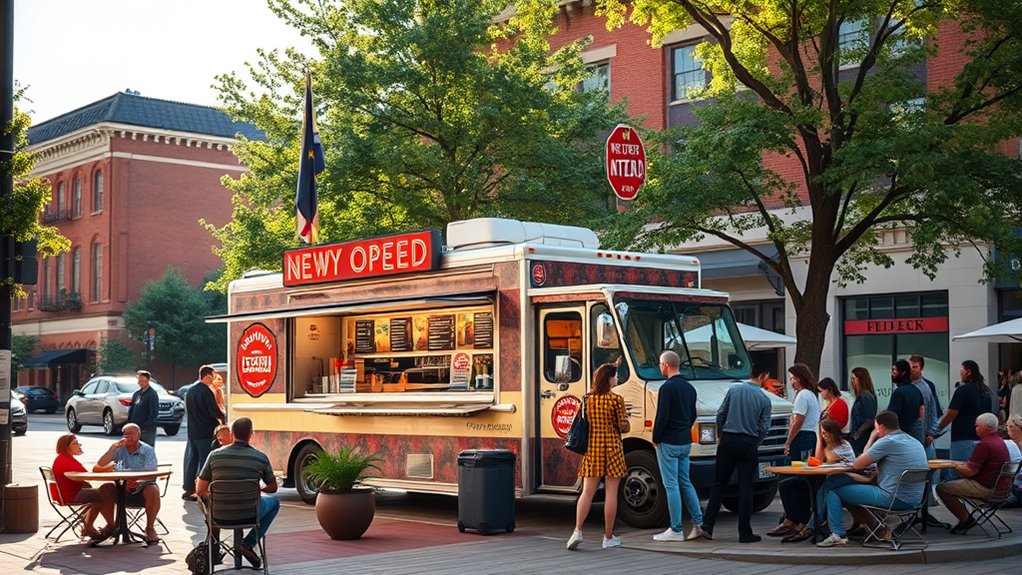
Choosing the right locations and hours for your food truck depends on understanding local zoning restrictions, permitted parking areas, and timing limits. You need to guarantee your spot is accessible and compliant with regulations to avoid penalties. By carefully selecting high-traffic zones and optimizing your schedule, you’ll attract more customers and build a steady presence. Additionally, considering juice cleansing and detox trends in the area can help tailor your menu to local preferences and boost sales.
Zoning Restrictions & Zones
Have you ever wondered where food trucks can legally set up shop in Columbia? Your options are guided by zoning districts and local regulations. You can operate on private property in districts like CD-4, CD-4C, CD-5, SD-LI, SD-HI, and Civic zones, but only temporarily. On public rights-of-way, vending is limited to designated areas within the CD-5 District or during special events with permits. Food trucks must follow city codes and obtain mobile vending permits to stay compliant. Residential zones usually restrict food truck activity to prevent neighborhood disruptions. Boone County zoning also influences outside-city locations to avoid overcrowding. Understanding these zoning restrictions is essential for legal operation. Ensuring compliance with local zoning helps prevent fines and operational interruptions, making it a critical step for successful food truck business. Additionally, staying informed about zoning restrictions can help you identify the best locations that maximize visibility and customer access.
Timing & Vending Limits
In Columbia, Missouri, food trucks are generally permitted to operate between 6:00 a.m. and 11:00 p.m., making timing a crucial factor for maximizing sales. Outside these hours, vending is prohibited unless you obtain special permits or operate in metered zones during events. Peak customer traffic happens during breakfast (7-9 a.m.), lunch (11 a.m.-2 p.m.), and dinner (5-8 p.m.), so aligning your hours with these times boosts sales. Most locations limit stay times to 2-4 hours to ensure fair access for multiple vendors. Longer hours may be granted for special events or private property with permits. Planning around local festivals, weather, and shift changes helps optimize your presence, while social media updates on hours and locations attract more customers. Using supported browsers ensures you can access online permit applications and updated scheduling tools without issues. Additionally, understanding vending limits in various zones helps you comply with local regulations and avoid penalties.
Permitted Parking Areas
To maximize your visibility and sales, selecting prime parking locations within approved zones is essential. Columbia’s downtown permits include Walnut Street between Ninth and Tenth Streets, Cherry Street between Sixth and Seventh, and Locust Street between Ninth and Tenth. Recent ordinance expansions add spots in front of the courthouse on Walnut (Seventh to Eighth), Artlandish on Walnut (Tenth to Hitt), and City Hall on Eighth Street. Focus on high foot traffic areas near offices, government buildings, and retail. Coordinate with the Downtown Community Improvement District and local businesses for advantageous spots. Remember, trucks must park curbside only, avoiding residential and school zones. Ensure your location complies with city parking rules, truck weight restrictions, and zoning regulations to stay within permitted zones. Current Food Truck Locations in Columbia, MO are limited but expanding to accommodate increased demand and support local food culture. Additionally, understanding permitted parking areas and regulations can help you avoid violations and enhance your mobile food business.
Crafting a Menu That Satisfies Local Tastes and Safety Standards
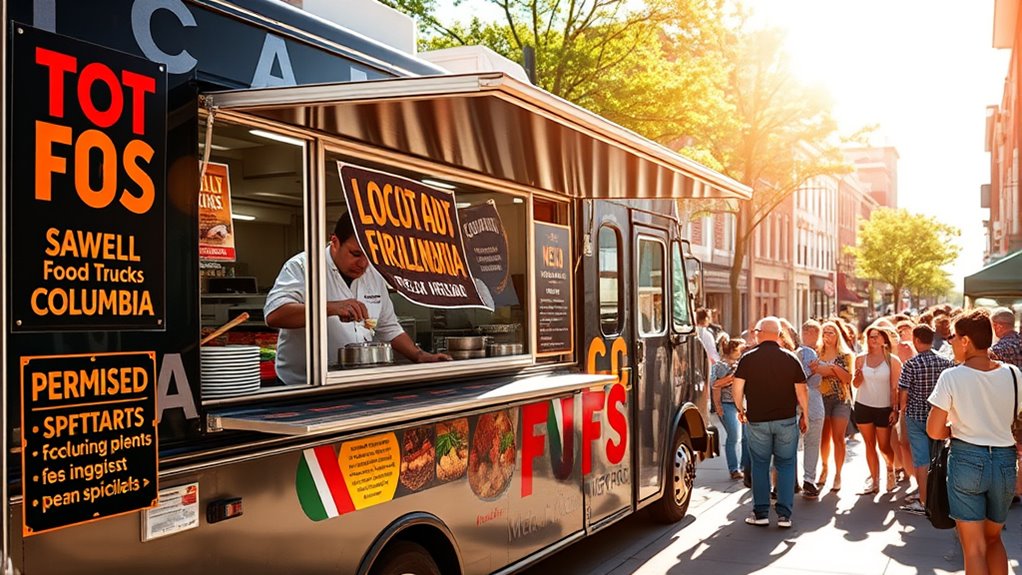
To create a menu that resonates with Columbia locals, focus on regional favorites like barbecue, tacos, and burgers, using locally sourced ingredients whenever possible. Keep the menu simple and quick to prepare, which helps guarantee quality and efficiency during busy hours. Make sure all items meet Missouri safety standards by handling and labeling foods correctly to protect your customers and your reputation. Additionally, ensure that all food items are prepared in approved kitchen facilities that meet state and local health regulations.
Local Flavor Integration
Understanding the local culinary scene is essential when crafting a menu that truly resonates with Columbia, MO’s residents. To connect with local tastes, focus on Southern and comfort foods like biscuits, barbecue, and pulled pork, which reflect regional history. Popular food trucks, like The Big Cheeze, showcase American classics with local twists—think grilled cheese with mac and cheese or bacon. Incorporate ingredients from regional suppliers, such as local dairy and produce, to boost authenticity and freshness. Highlighting local condiments, like regional BBQ sauces, helps deepen that connection. When designing your menu, aim for handheld, easy-to-eat items that suit on-the-go dining. Offering seasonal specials, like regional cheeses, adds variety without straying from familiar flavors. Partnering with local farms can further enhance the authenticity and support the community, creating a more appealing menu for residents. Additionally, understanding local food preferences ensures your offerings align with what residents enjoy, increasing your chances of success.
Safe Food Preparation
Ensuring safe food preparation is essential when crafting a menu that appeals to Columbia’s residents while meeting strict health standards. First, you must complete a certified food safety course and submit proof with your permit application. This training covers personal hygiene, cross-contamination prevention, and proper handling protocols, aligning with Missouri Food Code regulations. Your food truck needs equipment like handwashing stations, refrigeration, and waste disposal systems that meet health standards. All food must be stored at appropriate temperatures in approved containers, preventing bacterial growth and contamination. Use clear procedures for sanitation and avoid re-serving food. Regular health inspections evaluate sanitation, equipment, and employee hygiene. Focus on simple, safe menu items that can be prepared quickly and safely within your mobile setup. Incorporating proper food handling protocols ensures compliance and protects your customers’ health.
Menu Simplicity and Focus
Crafting a menu that resonates with Columbia’s residents involves focusing on local tastes and maintaining safety standards. You should incorporate regional ingredients like Missouri-raised meats, local produce, and Midwestern flavors to appeal to your audience. Emphasize comfort foods with a twist, combining familiar favorites with creative presentations. Tailor your menu based on demographic preferences—think barbecue, sandwiches, or ethnic fusion—especially for students and families. Keep your menu simple and curated, offering a few signature dishes to ensure quality and manage costs. This approach allows you to:
- Limit ingredient inventory, reducing waste and expenses
- Speed up prep and service times for high customer turnover
- Simplify staff training and ensure food safety compliance
- Incorporate vintage decor and rustic elements to enhance the overall dining experience, creating a welcoming atmosphere that complements your menu concept.
Implementing Effective Marketing Strategies to Grow Your Business
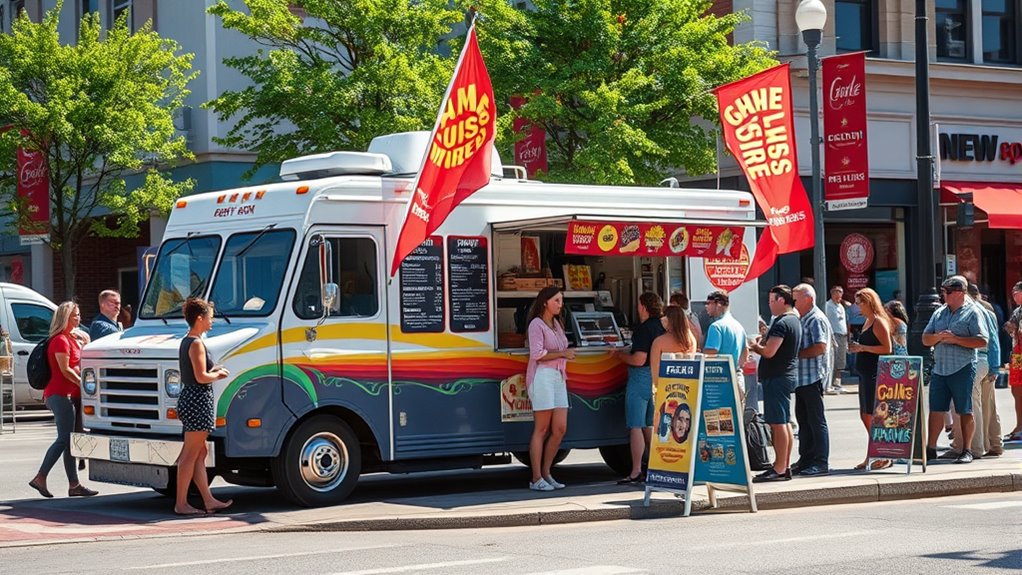
To grow your food truck business, implementing targeted marketing strategies is essential. Leverage social media platforms like Facebook, which 75% of food trucks use, to boost visibility. Social media campaigns have increased sales by 20% for many owners, and about 40% of customers find trucks through ads. Engaging actively online correlates with a 15% higher customer spend. Participating in festivals and events enhances brand awareness and foot traffic, while data analytics and mobile apps improve marketing efficiency and customer targeting. Building loyalty programs and email lists fosters repeat business, with over 50% of trucks reporting a 30% increase in repeat visits. Tailoring content to Millennials and Gen Z ensures relevance and discoverability.
| Strategy | Key Benefit | Implementation Tip |
|---|---|---|
| Social Media Promotion | Increased visibility and sales | Focus on Facebook and targeted ads |
| Community Engagement | Builds local loyalty | Join festivals and collaborate with vendors |
| Data Analytics & Apps | Boosts ROI and customer targeting | Use GPS and mobile ordering tools |
| Loyalty & Email Campaigns | Encourages repeat visits | Offer personalized incentives |
Ensuring Health and Safety Compliance in Your Food Truck Operations
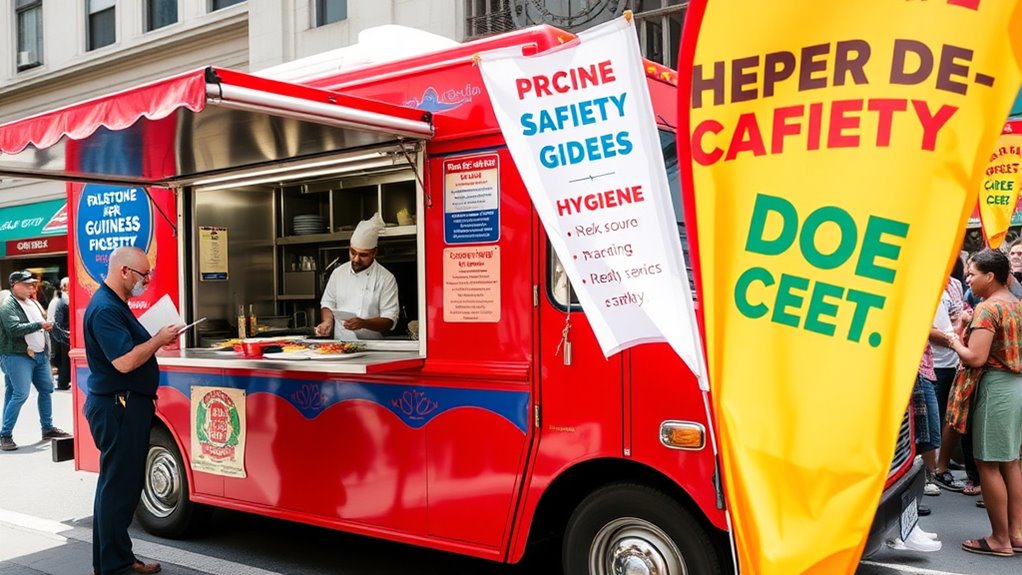
Maintaining health and safety compliance is essential for legally operating your food truck in Columbia. You must obtain a Mobile Food Establishment Permit from the city before starting, submitting documents like your business license, food safety certification, and health inspection certificates. All permits and certificates must be visibly displayed on your truck during operation. You’ll need to pass health inspections to verify compliance with public health standards. Operating from an approved commissary kitchen is required for safe food storage and prep.
Imagine your truck with clear permits posted, sanitized surfaces, and temperature-controlled storage. Your staff washes hands thoroughly, handles food with care, and keeps raw and cooked items separate. Proper sanitation and equipment maintenance ensure safety and compliance at every step.
Frequently Asked Questions
How Long Does It Typically Take to Obtain a Food Establishment Permit?
You’re wondering how long it takes to get a food establishment permit. Usually, it takes about 30 days once you submit a complete application, including all required details and fees. The process depends on how quickly the department reviews your paperwork and schedules inspections. If everything’s in order and inspections go smoothly, you could get your permit within that month, but delays are possible if there are issues or scheduling conflicts.
Are There Any Specific Vehicle Requirements for Food Trucks in Columbia?
You need to meet specific vehicle requirements in Columbia. Your food truck or trailer must be registered if it weighs 3,000 pounds or more, costing $20 annually. It must have working brakes, two red tail lights visible from 500 feet, brake lights, amber reflectors, and at least one safety chain rated for its GVW. Additionally, it must operate from an approved commissary and display current permits and safety certificates visibly.
Can I Operate at Multiple Locations Throughout the Day?
Yes, you can operate at multiple locations throughout the day. Columbia allows food trucks to move between six approved downtown spots under a single permit, as long as you follow regulations. You’ll need to schedule your routes carefully, stay within operating hours (avoiding late-night vending), and respect proximity rules near restaurants. Keep your health permits current, and coordinate with location owners to make certain of smooth, compliant multi-stop operations.
What Are the Common Penalties for Non-Compliance With Regulations?
Did you know violations lead to fines up to $500 per day? If you don’t follow Columbia’s food regulations, you face serious penalties. Common issues include operating without permits, working outside allowed hours, or violating health codes. These can result in hefty fines, permit revocation, or even court actions. Staying compliant guarantees you avoid these costly consequences and keeps your food truck business running smoothly.
How Do I Renew or Update My Permits Annually?
You need to renew or update your permits annually before June 30 to avoid interruptions. Submit your renewal online, by phone, in person, or mail, including all required documents like recent gross receipts and health inspection reports. Pay the full fee based on your receipts, using accepted payment methods. Contact the Boone County Department of Public Health at 573-874-7346 for guidance, and guarantee your business stays compliant with local health regulations.
Conclusion
Starting a food truck in Columbia is an exciting journey, but remember, “the early bird catches the worm.” Stay on top of permits, keep costs in check, choose busy locations, craft a menu locals love, and market wisely. By prioritizing safety and compliance, you’ll build a thriving business. With dedication and smart planning, your food truck can become a popular staple in Columbia’s vibrant food scene. Keep pushing forward—you’re well on your way!
